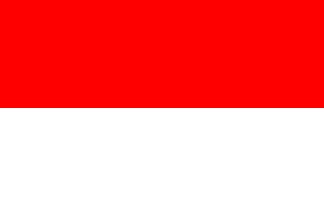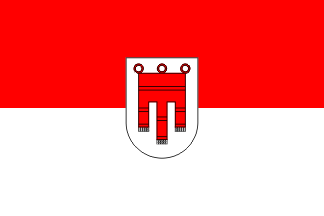

adopted 1946

Last modified: 2023-03-25 by martin karner
Keywords: vorarlberg | gonfanon | land | landesfarben | state flag | state service flag | bicolour: red-white |
Links: FOTW homepage |
search |
disclaimer and copyright |
write us |
mirrors

|

|
| by Jan Oskar Engene |
by Željko Heimer |
adopted 1946 |
Municipalities:
Fire brigades:
See also:
Das Wappen Vorarlbergs ist das Montfortische Banner. Es zeigt im silbernen
Schild eine mit drei gleich breiten, schwarz befransten Lätzen versehene, rote
Kirchenfahne an drei roten Ringen, die im oberen Teil von zwei und in den drei Lätzen je von drei schwarzen, schmalen Balken durchzogen wird. Die Enden der
drei Lätze verlaufen waagrecht.
Peter Diem, 16 August 2002
The coat of arms of Vorarlberg is the banner of Montfort. It consists
of a silver shield with a red church flag with three equal broad stripes
and black fringes. The flag hangs on three red rings. It has in the upper part
two and on each of the three stripes three black thin horizontal lines. The end
of the stripes is horizontal.
J. Patrick Fischer
Argent a Church Banner Gules (with three annulets and as many tails, charged with gamelles Sable and in tails three barrulets of the
same).
Željko Heimer, 20 August 2002
The charge in the arms of Vorarlberg is a gonfalon, also sometimes called a
gonfannon (it is not clear if these are considered heraldically different or not
as a charge - there are nuances of difference in the history of the flag type).
The standard heraldic depiction has the 3 rings at the top and often has three
tails, although there are various ways in which the tails may be depicted :
fringed or not, rounded or square ends, etc. It's a flag used in ecclesiastical
processions, the flag hangs down from a crossbar (which goes through the rings.)
The charge is of considerable antiquity. It can be found in a number of families
in the 14th C Zurich Wappenrolle, the front page of strip 2, families of
Velkirch, Tetnang, Kur, Hailigberg and perhaps elsewhere in the list. Here's a
link to an on line facsimile of the pages in question
http://ladyivanor.knownworldweb.com/zroadt2v.htm and to the introduction
http://ladyivanor.knownworldweb.com/zroaen0.htm. The thin black lines are
found in all the gonfannons in Strip II front page 1 (regardless of whether they
are red or yellow gonfannons) and I suspect they are artistic details (showing
seams perhaps?) rather than charges.
(As a side note the design of the gonfanon is very practical for a processional
banner. The long tails keep the banner from turning into a kind of sail (it
doesn't catch the wind) while the tails also provide the weight to hold the
banner straight. And the person carrying the banner onthe tall pole may see
which way he is going by looking between the tails.)
Leslie A Schweitzer, 21 March 2003
I note that the Vorarlberg device is described as "das Montfortische Banner",
which I presume means that it is a banner version of Montfort arms. There are a
number of Montfort families, but Rietstap has Montfort (Counts) as bearing
Argent a gonfannon gules with gold annelets (the suspending rings). The apparent
blazon for arms giving rise to the gonfannon illustrated on the Vorarlberg
shield would be Gules a bar gemel sable, which is not ascribed to any of the
Montforts by Rietstap.
The straightforward English blazon for the Vorarlberg arms would be "Argent a
gonfannon Montfort", since that is how the charge is described in German. If one
wanted to go the extra league one could say "Argent a gonfannon gules bearing a
bar genel sable repeated on the tails fringed of the same".
Melvyn Jeremiah, 21 March 2003